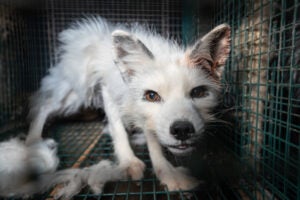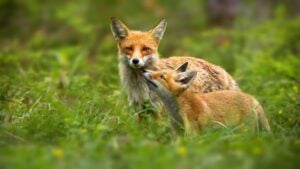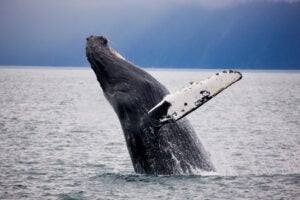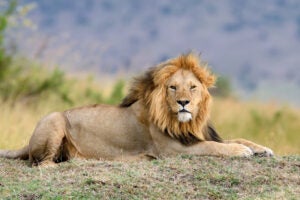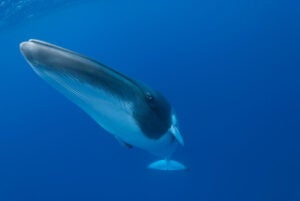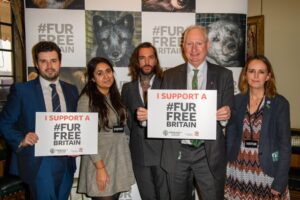
LONDON—Politicians, celebrities and campaigners gathered in Parliament today to celebrate the 20th anniversary of the UK becoming the first country to ban fur farming, and to urge the UK Government to ‘finish the job’ by banning fur imports and sales. The Only Way Is Essex star Pete Wicks attended and spoke about his previous visit to fur farms, and a new video message in support of the #FurFreeBritain campaign from comedian and actor Ricky Gervais was shown.
Two decades after the last fur farm closed down, the UK continues to allow imports of fur from animals farmed and trapped overseas, creating an unacceptable double-standard. If fur is too cruel to produce here, it is too cruel to sell here, argue the campaigners.
With the support of 35 cross-party MPs, including Elliott Coburn, Maria Eagle, Baroness Jenny Jones and Dr Lisa Cameron who attended a Parliamentary reception sponsored by Shadow Minister (Environment, Food and Rural Affairs) Daniel Zeichner MP in the House of Commons today, FOUR PAWS UK released a new report demonstrating the scale of abuse inherent in the trade and the role the UK continues to play in this cruelty. Attendees watched footage from Humane Society International/UK’s new investigation, undertaken on multiple fur farms in China, revealing the extreme suffering endured by raccoon dogs, mink and foxes for fur fashion. The shocking scenes showed baby animals kept in filthy, barren conditions, with many of the older animals found to be exhibiting signs of mental distress such as pacing and circling their tiny cages.
TOWIE star Pete Wicks was at the event supporting the call for a #FurFreeBritain. Reflecting on his experience of visiting Finnish fur farms with HSI/UK, Pete said: “Nothing can prepare you for how truly awful the fur trade is for these poor animals. We saw dead animals lying in the cages, fox cubs’ tiny paws falling through the wire mesh floor, and even one mink with a head wound being eaten alive by his cage mates. Looking into the eyes of these desperate animals, knowing that they were suffering simply to end up as a bobble on a hat, or a trim on a coat was so shocking. And to know that they could easily be killed for fur that ends up being sold in UK shops, was really upsetting. We simply cannot call ourselves a nation of animal lovers for as long as this cruelty is still being imported here, and while it’s still legal for it to be sold in our shops.”
In a video message, Ricky Gervais said: “The UK was the first country in the world to ban cruel fur farming, but 20 years later, the UK still has blood on its hands by importing fur from overseas. My message to the UK government is simple – end this double standard and BAN fur imports.”
There is strong public backing for a fur sales ban, with over 1.1 million signatures collected to date in support of a #FurFreeBritain. An April 2022 poll revealed 77% of British voters think the UK Government should ban the importation of animal products such as fur, where production methods are already banned in the country. The Government ran a consultation on the UK fur trade in May 2021 which amassed 30,000 responses, but has still not released the results.
Shadow Minister (Environment, Food and Rural Affairs) Daniel Zeichner: “Twenty years ago this month, the then Labour Government shut down the last UK fur farms for good when the Fur Farming (Prohibition) Act came into force. However, 20 years on, despite the UK’s strong and unequivocal ethical stand against fur, we are now outsourcing our cruelty overseas. A Labour Government would take action on this double standard and deliver a fur free Britain.”
Elliot Colburn, MP for Carshalton and Wallington said: “The British public rightly has high expectations that the government will deliver promised improvements in the laws that protect animals, and it’s important that we set high standards for the products that we allow to be imported and sold here. We rightly banned fur farming across the UK because it’s so cruel, and now we have the opportunity to lead the way again by banning fur sales, as California has done. The Government has already gathered 30,000 responses in its call for evidence on the UK fur trade, I look forward to seeing the results, which will undoubtedly help inform and underpin a strong policy position.”
Claire Bass, senior director of campaigns and public affairs at Humane Society International/UK, said: “Action on banning the UK’s trade in fur, and other hugely popular and promised animal welfare legislation, has been kicked into the long grass since last summer, and we urge Rishi Sunak and Therese Coffey to get back on track to deliver the Government’s much-applauded Action Plan for Animal Welfare. As politicians and the public start looking at what might be on the menu in manifestos for the next election, committing to ban the cruel and unnecessary fur trade is a wide open goal for all political parties, and we’re delighted with the strong cross-party support for the campaign. The future of fashion is fur free so the sooner we stop trading in cruelty the sooner the suffering overseas stops.”
Sonul Badiani-Hamment, FOUR PAWS UK country director, said: “Globally, the UK is lagging behind and propping up a dying industry. In 2021 Israel became the world’s first country to prohibit the sale of fur and 12 US towns and states have also banned fur sales. And it’s not just governments taking action; from the runways to the high street, the fashion industry has been leading the way for decades, with retailers and consumers alike shunning the cruel and exploitative fur trade. As we mark two decades since fur farming was banned in the UK, it is high time we fully address the UK’s role in what is left of the fur trade and stop importing and exporting cruelty for good. Only by embracing a Fur Free Britain can we help save the lives of millions of animals who are needlessly killed for this abhorrent trade.”
The Parliamentary reception coincided with the launch of an official e-petition calling on the Government to ban the import and sale of fur from all species.
ENDS
Media contact: Sally Ivens: 07590 559299; sivens@hsi.org

